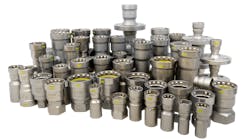WASHINGTON, DC — The US Environmental Protection Agency (EPA), supported by state and local governments, the private sector, communities, and academia, is kicking off its eleventh annual SepticSmart Week. SepticSmart week 2023 encourages homeowners, wastewater professionals, and local officials to design and maintain effective septic systems to help serve their communities. Visit www.epa.gov/septic to learn more.
Organizations and individuals wishing to promote SepticSmart Week 2023 are encouraged to create public awareness about the event and share helpful tips, such as:
- Think at the Sink!: What goes down the drain has a big impact on your septic system. Fats, grease, and solids can clog a system’s pipes and drainfield.
- Don’t Overload the Commode!: A toilet is not a trash can. Disposable diapers and wipes, feminine hygiene products, coffee grounds, cigarette butts, and cat litter can damage a septic system.
- Don’t Strain Your Drain!: Use water efficiently and stagger use of water-based appliances. Too much water use at once can overload a system that hasn’t been pumped recently.
- Shield Your Field!: Tree and shrub roots, cars, and livestock can damage your septic drainfield.
- Keep It Clean!: Contamination can occur when a septic system leaks due to improper maintenance. Be sure your drinking water is safe to drink by testing it regularly.
- Protect It and Inspect It!: Regular septic system maintenance can save homeowners thousands of dollars in repairs and protect public health.
- Pump Your Tank!: Ensure your septic tank is pumped at regularly intervals as recommended by a professional and/or local permitting authority.
SepticSmart Week 2023 encourages homeowners, wastewater professionals, and state, tribal, and local officials to promote workforce development in the septic industry through training and educational opportunities. Be part of the solution by visiting www.epa.gov/septic/decentralized-wastewater-treatment-workforce for an abundance of resources and information.
Background
More than one-fifth of US households utilize an individual onsite (septic) system or small community cluster septic system to treat their wastewater. These systems treat and dispose of relatively small volumes of wastewater and include a wide range of individual and cluster treatment options to process household and commercial sewage. These systems go by such names as septic, decentralized wastewater treatment, cluster, package plants, on-lot, individual sewage disposal, and private sewage.
Onsite systems provide a cost-effective, long-term option for treating wastewater, particularly in sparsely populated areas. When properly installed, operated, and maintained, these systems help protect public health, preserve valuable water resources, and maintain a community’s economic vitality.
EPA’s SepticSmart initiative is a nationwide public education effort offering educational resources to homeowners, local organizations, and government leaders to explain how septic systems work and provide tips on how to properly maintain them.



